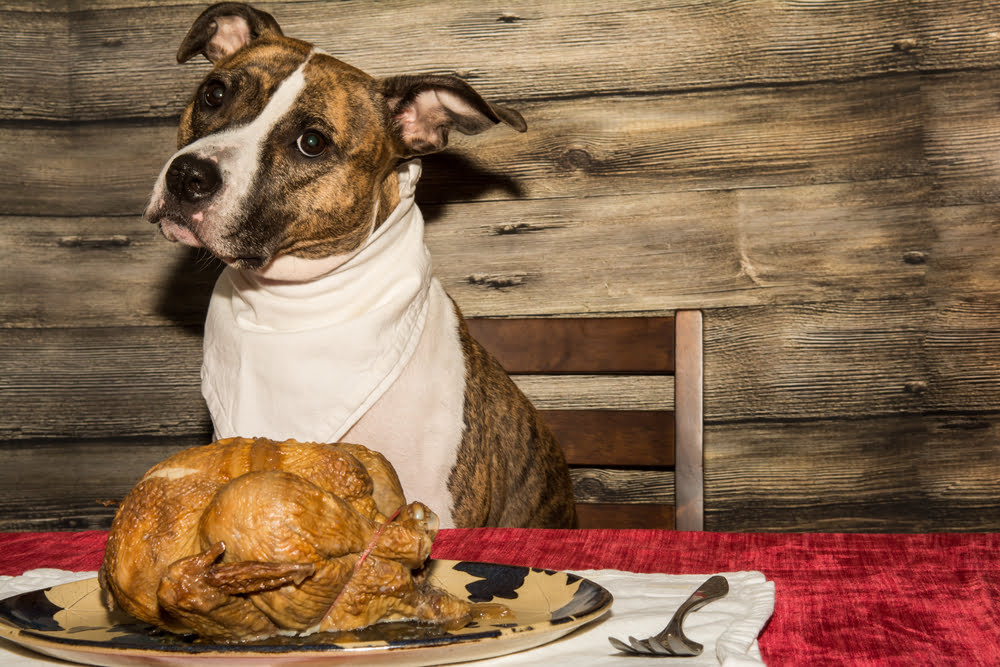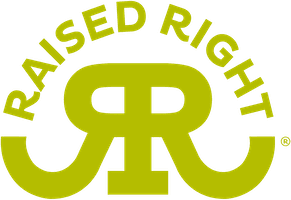
Turkey is a versatile meat that we use in everyday meals and it’s famous for its role in Christmas and Thanksgiving dinners around the world. You may have often wondered could you give your dog a little piece during dinner or a bit of the leftover turkey afterward. It poses the question to dog owners, can dogs eat turkey? In the past, we’ve answered similar questions, so go ahead and find out if dogs can eat cooked chicken, cooked pork and cooked beef.
The short answer is yes! Plain pieces of turkey meat offer many nutritional benefits to our canine friends. Turkey is a key ingredient in many dog foods. However, there are certain parts of the turkey and processed turkey products that we don’t feed to our dogs and we’ll discuss these in more detail below.
The Nutritional Benefits of Turkey for Dogs
First of all, let’s look at the nutritional statistics of turkey and see how beneficial it may be for our dogs.
Two slices of turkey (84 grams) with no skin contain;
- Calories: 117
- Protein: 24 grams
- Fat: 2 grams
- Carbs: 0 grams
Turkey is an important source of B vitamins (niacin, pyridoxine, B12) which are important for brain function and cell health. It’s also a good source of riboflavin, thiamine, selenium, zinc, and phosphorous. These vitamins and minerals are essential for a healthy immune system and to support a healthy body.

Plain pieces of turkey meat offer many nutritional benefits to our canine friends.
From this, we can see that turkey is a nutritious food containing a lot of protein and plenty of vitamins and minerals that are needed to support body growth and health for our dogs.
Turkey That Dogs Can Eat
Turkey is a healthy protein-filled meat that dogs can enjoy and have added to their diets. However, they can’t eat all sources of turkey. It’s important to feed them a safe form of turkey that isn’t going to cause health issues. The safest form of turkey is plain, unseasoned turkey meat like turkey breast or turkey thighs. It’s vital that the turkey being fed to your dog doesn’t contain fatty pieces of skin or cooked bones. We’ll discuss why in more detail below.
Turkey Not to Feed Your Dog

Bones can be very harmful if ingested by your dog.
We’ve established that turkey is safe to feed your dog and that the safest form is plain, unseasoned pieces of turkey meat (or seasoned with a small amount of spices that aren’t harmful to dogs, such as spearmint). This is because some parts of the turkey are harmful including;
Turkey bones
Bones can be very harmful if ingested by your dog. Cooked bones can splinter and become very sharp which as you can imagine can cause a lot of harmful side effects. On the milder scale, bones can cause a tummy upset and in some cases the presence of blood in your dog’s feces. In more severe cases, the ingestion of bones can cause intestinal obstruction (a blockage in your dog’s guts preventing the passage of feces), intestinal perforation (a tear through the intestines), or injuries to the mouth/upper gastrointestinal tract from sharp pieces of bones. The latter often requires emergency veterinary treatment which might involve; x-rays, ultrasound, intravenous fluids, antibiotics, and emergency surgery.
Turkey Skin and Fat
Turkey skin is very high in fat and along with obvious fatty pieces of meat, can cause issues for our dogs if they eat these parts of the turkey. High amounts of fat can cause tummy upsets and discomfort. In more serious cases, fatty foods can irritate the pancreas and cause pancreatitis (inflammation of the pancreas) which requires intensive veterinary treatment. Dogs that have underlying gastrointestinal issues like inflammatory bowel disease will be more sensitive to high amounts of fat in the diet and this will likely irritate their condition.
Processed Turkey and Additives

Processed turkey can be quite high in sodium and contain seasoning that is harmful to our dogs like garlic, onions, etc.
Many forms of turkey that we see in supermarkets are processed or already seasoned. This includes turkey sausages, turkey lunch slices, turkey bacon slices (alternative to pork), pre-cooked turkeys, or pre-seasoned/marinaded turkey meat. These forms of turkey can be quite high in sodium and contain seasoning that is harmful to our dogs like garlic, onions, etc.
Processed turkey can sometimes be mixed with other meats e.g. bacon, ham, pepperoni, etc. which are very high in sodium and fat. Too much sodium in a dog’s diet can increase the chance of high blood pressure and affect dogs that have heart issues.
When to See a Vet
Your dog might eat a bit of fatty skin and be fine but it’s better to be safe than sorry. If your dog has eaten fatty bits of skin, monitor closely for any signs of a tummy upset e.g. vomiting, diarrhea, reduced appetite, reduced drinking, or sore tummy. See your vet for advice if you think your dog is unwell from eating this.
If your dog eats any quantity of bones, I would highly recommend a check-up with your veterinarian as soon as possible after the ingestion. Some dogs have eaten bones and been lucky but this is not the case for all dogs and some have become seriously unwell so it’s important to see your vet straight away. Processed turkey can contain lots of different seasonings and other meats so see your vet if you think your dog has eaten something harmful.
It’s important to note that some dogs will be much more sensitive to and likely to become unwell after eating processed meats, seasonings, fatty skin, etc. These may be dogs with sensitive tummies but they may also be dogs that have serious underlying health conditions e.g. diabetes, inflammatory bowel disease, chronic pancreatitis, etc. and these dogs could become very unwell after eating certain foods. If your dog has an underlying health condition and has eaten something that may be harmful, don’t hesitate in calling your vet.
Conclusion
Turkey is healthy meat high in protein, vitamins, and minerals. Plain unseasoned slices of turkey meat are a healthy food or treat for your dog. Avoid giving your dog turkey bones, skin and processed turkey products (sausages, lunch slices) as these may contain harmful additives and seasonings.
Frequently Asked Questions
Can turkey upset a dog’s stomach?
Yes, it can if your dog eats turkey skin, bones, processed or seasoned turkey. It’s unlikely that your dog will get an upset stomach if it eats plain, unseasoned turkey meat.
Why can’t dogs eat turkey?
Dogs can eat turkey! They can eat plain, unseasoned pieces of turkey meat like turkey breast & turkey thighs. Avoid bones, skin, and processed turkey.
Can dogs eat turkey slices?
Yes! Dogs can eat unseasoned plain turkey slices. Avoid processed turkey lunch slices.



